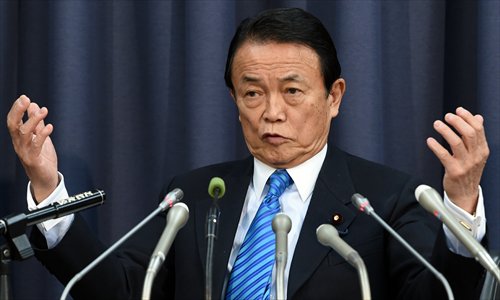HOME >> CHINA
Japan defense hike prompts hopes for peaceful path
By Chen Heying Source:Global Times Published: 2015-1-15 0:23:01

Japanese Finance and Deputy Prime Minister Taro Aso answers a question during his press conference at the finance ministry after Prime Minister Shinzo Abe's cabinet approved the state budget plan in Tokyo on Wednesday. Photo: AFP
China's foreign ministry said Wednesday they hope Japan can draw lessons from history and follow the path of peaceful development in response to a record-high military budget approved by the Japanese government.
"Being a weather vane in telling Japan's pursuit of a peaceful development path, Japan's policies in the military and security field have always attracted great attention from its Asian neighbors and the international community. We hope that the Japanese side can draw lessons from history, follow the path of peaceful development and work constructively to promote regional peace and stability," Hong Lei, foreign ministry spokesperson said at a briefing.
Japanese Prime Minister Shinzo Abe's cabinet approved a 4.98 trillion yen ($42 billion) national defense budget for the fiscal year starting on April 1, the third consecutive annual rise since Abe took office in 2012.
The draft budget for the fiscal year from April includes a 2.8 percent rise in defense spending for items such as planes, naval vessels and fighting vehicles, according to Reuters.
Although the increase in defense spending is relatively minor, it means Japan can focus on developing conventional military equipment, which has been strengthened "noticeably," said Liu Jiangyong, deputy director of the Center of International Studies at Tsinghua University.
"The level of defense spending reflects the amount necessary to protect Japan's air, sea and land, and guard the lives and property of our citizens," Japanese Defense Minister Gen Nakatani said on Sunday.
The increased spending is mainly to enhance Japan's capability to defend remote islands in the East China Sea in the face of "China's growing maritime assertiveness," the Jiji Press reported.
Japan reportedly plans to deploy 12 maritime patrol vessels to the waters around the Diaoyu Islands by 2016.
"The deployment makes clear that Japan is targeting China. The country is seeking to establish naval and air supremacy in the East China Sea, where the Diaoyu Islands are located and to pose strategic threats," Liu said.
Posted in: Diplomacy